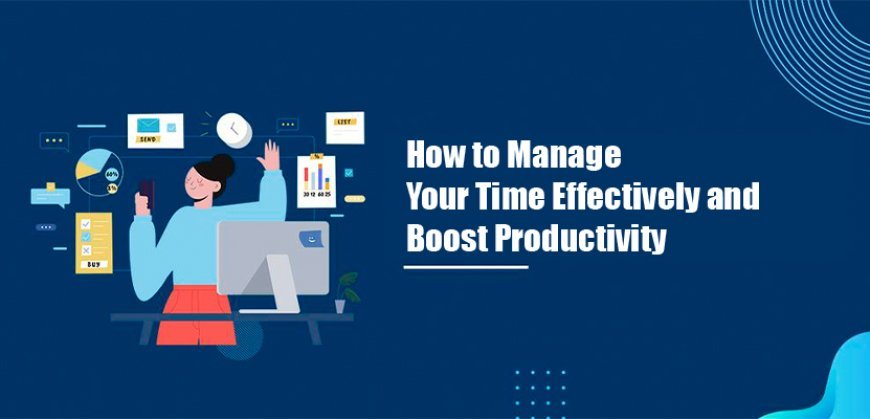How to Manage Your Time Effectively and Boost Productivity
The modern workplace moves fast. There’s always another deadline, another email, another meeting. If you’re not careful, your workday can disappear without real progress

The modern workplace moves fast. There’s always another deadline, another email, another meeting. If you’re not careful, your workday can disappear without real progress. Poor time management doesn’t just slow you down—it drains energy, increases stress, and leaves you feeling unproductive.
The good news? You don’t need more hours in the day—you need smarter strategies. Here’s how to manage your time like a pro and get the most out of your workday without sacrificing your sanity.
Define Clear, Actionable Goals (Not Just a To-Do List)
Why It Works
Vague goals lead to scattered effort. Without clarity, you end up reacting to whatever comes your way instead of working with purpose.
How to Make It Work for You
Use the SMART framework to keep goals focused and achievable:
· Specific: Define the goal in detail. Instead of "Write an article," say "Complete the first draft of the article by 3 PM.
· Measurable: Track progress, whether it’s words written, tasks completed, or calls made.
· Achievable: Be realistic. Overloading your day with impossible tasks sets you up for failure.
· Relevant: Focus on what truly matters to your role or business.
· Time-bound: Set deadlines to create urgency and keep yourself accountable.
When goals are precise and realistic, you’ll waste less time figuring out what to do next.
Prioritize Like a CEO (Eisenhower Matrix)
Why It Works
Not every task deserves your time. Some are urgent, some are important, and some are just distractions disguised as work.
How to Make It Work for You
Use the Eisenhower Matrix to sort your workload:
· Urgent & Important: Handle immediately. These are the fires you can’t ignore.
· Important but Not Urgent: Schedule them. These are long-term priorities. Things like strategy, learning, and professional growth.
· Urgent but Not Important: Delegate them. If it doesn’t need you specifically, pass it on.
· Neither Urgent nor Important: Cut it. Social media scrolling? Pointless meetings? Time wasters need to go.
This system forces you to focus on what moves the needle instead of just staying busy.
Use Time Blocking to Stay in Control
Why It Works
Multitasking is a productivity killer. Jumping between tasks wastes mental energy and slows you down. Time blocking helps you stay focused on one thing at a time.
How to Make It Work for You
· Block dedicated time for deep work, emails, meetings, and admin tasks.
· Use color-coded calendars to visually separate different work types.
· Leave buffer time for unexpected tasks so they don’t derail your day.
Time blocking puts you in charge of your schedule instead of letting your schedule control you.
Use the 2-Minute Rule to Eliminate Small Tasks
Why It Works
Tiny tasks add up. Instead of letting them pile up, knock them out instantly if they take two minutes or less.
How to Make It Work for You
· Reply to short emails immediately.
· Approve quick requests without delay.
· Tidy up digital files as you go.
This keeps minor tasks from stealing focus from bigger priorities.
Delegate Without Guilt
Why It Works
You don’t have to do everything yourself. Trying to handle every task on your plate leads to burnout, slower work, and poor results.
How to Make It Work for You
· Identify tasks that don’t need your direct input.
· Give clear instructions when assigning work.
· Trust your team. Don’t micromanage.
· Follow up, but don’t interfere.
Delegation frees you up to focus on high-value work.
Follow the 52/17 Rule for Peak Productivity
Why It Works
Long work sessions drain energy. Science shows that working in bursts boosts focus and efficiency.
How to Make It Work for You
· Work with full focus for 52 minutes.
· Take a 17-minute break. Stretch, walk, grab a coffee.
· Repeat the cycle.
This method keeps your brain fresh and your productivity high.
Cut Down on Meetings (Most Are Useless Anyway)

Why It Works
Meetings eat up hours and rarely accomplish much. If a meeting doesn’t have a clear purpose, it shouldn’t happen.
How to Make It Work for You
· Only schedule meetings when absolutely necessary.
· Set strict time limits. 30 minutes max.
· Send an agenda beforehand to keep things focused.
· Encourage standing meetings; they’re shorter and more efficient.
By cutting unnecessary meetings, you gain back valuable work hours.
Use Productivity Tools (But Don’t Overcomplicate It)
Why It Works
Tech can keep you organized, but too many apps can be just as distracting as too few.
How to Make It Work for You
· Use project management tools like Trello or Asana to track progress.
· Set reminders in Google Calendar to stay on top of deadlines.
· Use a Pomodoro timer to stay focused.
· Stick to tools that simplify your workflow, not complicate it.
A few well-chosen tools can make a huge difference.
Stop Multitasking (It’s Slowing You Down)
Why It Works
Switching between tasks makes your brain work harder than necessary. Focusing on one task at a time leads to better, faster results.
How to Make It Work for You
· Turn off notifications.
· Use ‘Do Not Disturb’ mode while working.
· Schedule time to check emails instead of checking constantly.
The more you protect your focus, the more you’ll get done.
Take Breaks (Yes, really—It Helps)
Why It Works
Non-stop work kills creativity and energy. Short breaks keep you sharp.
How to Make It Work for You
· Follow the Pomodoro technique (25 minutes work, 5 minutes break).
· Get up and move; it refreshes your mind.
· Avoid screen time during breaks. Rest your eyes.
Regular breaks help you work smarter, not just longer.
Conclusion
Time isn’t the problem. How you use it is.
Mastering time management doesn’t mean working harder. It means working with focus, intention, and efficiency.
Implement these strategies and watch your productivity (and work-life balance) improve instantly.

 Admin
Admin